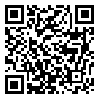

BibTeX | RIS | EndNote | Medlars | ProCite | Reference Manager | RefWorks
Send citation to:
URL: http://hcjournal.arums.ac.ir/article-1-433-en.html
Background & objectives: Addiction is one of the most important social deviations that is a basis for many social issues and disorders in the society. The aim of this study was to survey the relationship between attachment style and impulsivity with tendency to addiction.
Methods: The study was a descriptive-correlational researchand was performed on students of Mohaghegh Ardabili University who were studying in the academic year 2014-2015. A sample of 240 persons was selected by the cluster sampling method. The questionnaires including Addiction Potential Scale (IAPS), Attachment style, and Impulsivity questionnaire were used for data gathering. Correlation test and regression analysis were used to data analysis by spss-18.
Results: Findings indicated that secure attachment (r=-0.44), ambivalent attachment (r=0.27), disorganization (r=0.25), motor impulsivity (r=0.44), and cognitive impulsivity (r=0.43) are correlated with tendency to addiction. Results of regression analysis showed attachment and impulsivity can explain 20% of the variance of tendency to addiction.
Conclusions: According to the findings, proper planning and implementation of training courses for the families can provide appropriate background for the creation of secure attachment in children. In addition, impulsivity can be controlled through applying workshops in the fields of life skills, problem solving, and decision-making.
| Rights and permissions | |
 |
This work is licensed under a Creative Commons Attribution-NonCommercial 4.0 International License. |


